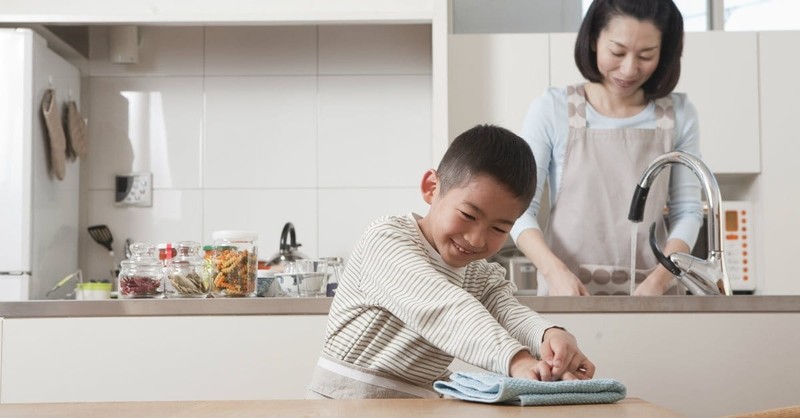How Organization Helps Create a Peaceful Home
- Melissa Morgner HalfDozenMama.com
- Published May 09, 2014

Staying home with our children is one of the sweetest blessings of homeschooling, but it also presents an inherent challenge: lived-in homes get messy more quickly than empty ones. The family home can be quickly overtaken by the stuff of a learning lifestyle—textbooks, teacher’s manuals, art supplies, science experiments—even eating three meals a day at home makes for more messes. Although we have more time at home than the average family, the homeschooling life is a busy one with a focus on learning that often looks past the mess on the floor as we focus on accomplishing the next lesson. Fortunately, as homeschooling parents, we can approach this dilemma and its solution as an opportunity to teach a valuable life skill. Add the subject of “organizational arts” to your homeschool planner and get ready to teach your children how to bring order to their spaces. Best of all, as they accomplish their “homework,” you’ll reap the benefits of a more organized, peaceful home.
Teaching From the Right Perspective
Before we can jump into the mess with our kids and begin lessons in organization, we must first make sure we have the right perspective. There are five essential precepts we need to understand before successfully teaching our children to get organized.
1. Organization is not perfection. Organization is a structured way of keeping things so you can easily find them and use them. When your home is organized, it will function well, but it isn’t necessarily going to look like the cover of a magazine. To some degree, involving your children in the process of organization means letting go of control. If you want your children to take ownership, then you have to relinquish it. It will be worth it in the long run. If a child is going to maintain his personal space, the way things are organized has to make sense to his way of thinking, not yours.
2. Organization is a lifelong habit. Teaching your kids to be organized isn’t a one-shot lesson but rather a lifelong process— some might even say a challenge. Ideally, it begins in early childhood when the toddler learns that after playtime, all the blocks need to be picked up and thrown into the bin. It continues toward adulthood as life moves from a bedroom, to a dorm room, to an apartment, and ultimately, to a home of his or her own. All of these stages will take what they know about being organized and challenge it to move up to the next level, which takes time, practice, and patience. Realize that you will be walking beside your children as they learn these lessons in your home. They will have successes, but the challenges will continue, and your job will be to lovingly guide them toward the goals of peace and efficiency.
3. Organization is difficult for some. Children possess natural abilities; some have a knack for organizing, and some do not. Of my six children, half of them exhibit this natural talent to see a mess, sort through it, and organize their space. The other half seems clueless about the need and overwhelmed with the thought of sorting out their belongings with any semblance of order. That doesn’t mean they aren’t required to do it; it just means we work at a slower pace and approach the challenge in small incremental steps without judgment or making the child feel “less than” for not possessing this ability. Chances are these kids are gifted artists and exhibit creativity in other ways. Your job is to help them tap into their God-given creativity and apply it to the task of organizing their stuff.
4. Your attitude is contagious. Organizing can and usually should be fun. You’re going take a mess, attack it with your best problem-solving skills, and transform the mess into a functional space. It’s an exciting process that is full of possibilities. Keep the atmosphere light and hopeful. If “getting organized” is talked about as a dreaded task, your children will inherit that mood, which will only serve to make organizing more difficult.
5. Think of yourself as a consultant. Remember, your goal is to turn over control and maintenance of your child’s space to him, so you’ve got to get him to think about how he uses his space and the stuff in it. Like a good consultant, ask him questions about how he uses things, where he keeps things, and why certain areas are the way they are, in a non-accusatory way, of course. Your goal here is to observe what’s happening in the space and then ask your child questions that will help him get to the bottom of the problem. Often, the answers will reveal an underlying obstacle to organization that can be fixed with some organizing tools (bins, tubs, caddies, etc.), moving furniture around to better suit the way the space gets used, or getting rid of some belongings.
For instance, my super creative and artistic daughter has a wonderful desk with a hutch in her bedroom, yet it was always covered with a mess of unrelated stuff, keeping her from using it to draw and create. After talking with her about what she’d like to do there, she realized that she’d need to move some things off the shelves and out of the drawers so that she could keep all of her art supplies nearby, where she wanted to use them. It also helped her to envision what she’d like to see happening in that space and ultimately gave her inspiration to keep the space free of clutter in the future.
Tapping Into Your Child’s Motivation
Now that you understand your role and have the right perspective, it’s time to impart that to your child. Instead of organizing the whole bedroom, start with a small area, such as a dresser, a bookshelf, or the closet. Then move on to another small spot the next time. It can be overwhelming to a child when Mom says, “We’re going to clean your room today,” but it’s a bit less intimidating to hear her say, “We’re going to organize your desk this afternoon.”
Begin in this space working side by side with your child. As older children get the hang of it, you can give some directions and dart off for a few minutes, coming back to check their progress. Younger kids usually lose focus when Mom leaves the room. Work in small chunks of time with very specific areas of focus, breaking down big jobs into smaller, manageable parts. Some kids are inspired by a timer; others get stressed out by the ticking. If you can make a game of some aspect of organizing, go for it. Find what works to motivate your child and help him stay on task. Motivation is a complicated thing, and if I had the magic answer to keep your children motivated, I’d be thrilled to tell it to you. You’ll need to study each of your children. Ask the Lord for wisdom and insight into what will help each child. Observe what’s difficult for them. What’s easy? What are they asking to do? For my family, the ones who are born organized just take a bit of praise and moving around within their space to get their brains and bodies in gear. One in particular loves to rearrange furniture— if I help her move some pieces around, the rest of the room gets tidy in no time. My less organizationally blessed children need more inspiration. I’ve seen some of my children come alive when given cleaning products. Try giving them a vacuum or cleaning tool. Even a bottle of Windex and a rag has been known to get the juices flowing in some of my children.
Although we are focusing on organizing, cleaning can help jump start the process and will overflow into the rest of the room. I can’t explain how it works, but it does. Some children might be motivated by the decorating process. Let them create an art project to adorn the wall or sew a pillow for the bed. Once children are motivated, the rest comes much more easily. Getting them to care about their space is part of the process of taking personal ownership and responsibility. Pray and watch and see what gets their gears going.
The Work That’s Never Done
The work of organizing calls for endurance. The daily aspect of organizing requires us to work the system we’ve created until habits forge together, creating character. It takes just a few days to get organized, but it will require daily discipline to stay that way. Give yourself and your kids lots of grace, and stick with it. Teaching your children to get organized trains them in so many areas— from stewardship of their belongings, to keeping a home, to diligence in their work, and even time management. It will be hard work—there’s no escaping that— but the benefits will bless your family now and for years to come. Organization is a lesson worth teaching and a life skill worth learning.
Questions a Wise Consultant Should Ask
-
What problems do you see in your room that you’d like help solving?
-
What would you like to do at this desk? Or in your closet?
-
Where would be a good place to keep your board games? Socks? Blocks?
-
Do you have too much of anything?
-
Is there anything you need to make your space work better?
-
What could we do to solve this specific problem?
-
Do you still use this?
-
Do you still need this?
- Is this something you really love?
Melissa Morgner is a happy wife of eighteen years to her college sweetheart and mother to six loud but lovable children ranging in age from 14 down to 4. While she likes a clean, organized house, she strives toward peace, not perfection. Her busy household puts her gifts of juggling and winging it to the test daily. She steals moments to write on her blog, HalfDozenMama.com, about the lessons she’s learning from the Lord in the routine but privileged tasks of mothering.
Copyright 2012, used with permission. All rights reserved by author. Originally appeared in the May 2012 issue of The Old Schoolhouse® Magazine, the family education magazine. Read the magazine free at www.TOSMagazine.com or read it on the go and download the free apps at www.TOSApps.com to read the magazine on your mobile devices.
Publication date: May 9, 2014



















